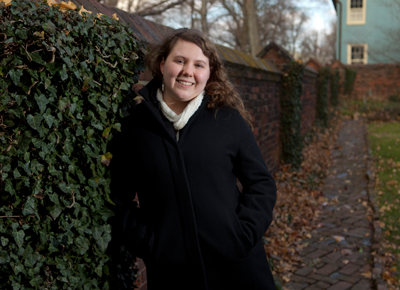Rebecca Street Undergraduate Student by Amber Scott photos by Mark Cornelison

Rebecca Street grew up in Clemson, S.C., a town known for being the home of Clemson University, for historic houses and for thick Southern drawls. Also for neighboring Greenville, S.C., home to BMW's North American Headquarters, and it is this latter fact, oddly enough, that set Street on the path to studying linguistics at the University of Kentucky. "In high school, I did an exchange program in Germany that was sponsored by BMW since my high school had one of the best German language programs in the state," she said. "It was my first time being abroad, and it really got me interested in what life is like in other places. That was my inspiration for deciding that languages and other cultures were what I was interested in." Drawing on that newfound interest and an off-the-cuff suggestion from her sister-in-law that she choose a major in linguistics, Street started applying to schools. Thanks to the Academic Common Market, a cooperative program created by the Southern Regional Education Board that offers discounted tuition to out-of-state students whose home state universities don't offer their area of study, she was able to come to UK. It was during her very first linguistics class that she knew she was in the right place. "My first semester in college I was so glad I had chosen linguistics as my major," said Street. "All the professors are so nice. They all have a passion for teaching that you don't really find in most colleges and in most programs. Greg Stump is probably one of the most accessible directors of programs that you'll find. If he's in his office, you can come in there and talk to him. All of the professors are really like that. Their doors are always open, which makes such a large university seem really small." Street said that the connection she has to her professors and her peers extends beyond the classroom. Several of her professors have hosted dinners or class activities at their homes, and she continues to have relationships with fellow students who have already graduated from the program. "There's a real intimacy in the program that makes it very special," said Street. "It provides you the kind of connections that you typically don't get until you get to graduate school." Street is relying on that intimacy and camaraderie more and more as she nears completion of her undergraduate degree. She recently spent several hours in Rusty Barrett's office discussing her future career goals and his recommendations for graduate study -- she's never even had him as a professor -- and she plans to accomplish some undergraduate research in her last semester under the guidance of Mingzhen Bao. Street said the undergraduate research opportunities offered by UK's Linguistics Program have been one of the distinguishing points on her applications to graduate schools. Not many programs offer research opportunities at the undergraduate level, and she hopes that her research experience, along with her regular presence on the Dean's List and her participation in the Honors Program, will gain her acceptance to UCLA, UC Berkeley or University of Arizona. She is also enthusiastic to work with Bao because of the experiences she's had with her in the classroom as a student learning Chinese. During her sophomore year, with some intense Mandarin training under her belt, Street received a scholarship to study abroad in China from the School for International Training. While most of her peers were in China to study its politics, Street was there to explore how language affects interaction. "Linguistics is a lot of things," she said. "For me, I focus on sociocultural linguistics, looking at how the language and the way people talk affects the culture and how that affects the way people live." Street said learning Mandarin was one of the biggest challenges she's had as a linguistics student, but it has been a challenge she enjoyed immensely. She has also studied Haitian Creole, German and the dead language of Sanskrit, and while she hasn't had the opportunity to take it yet, she is proud that her program is one of only three in the country that offer a course in K’iche’, a Mayan language teetering on the brink of extinction. "The emphasis of the program here is a broad spectrum, getting you exposed to everything," said Street. "The education is really comprehensive, and they encourage you to do your own things with what you learn in the classroom." And Street is determined to do just that. She plans to build upon what she's already learned as an undergrad and hopes graduate school will give her the opportunity to expand her global awareness and apply her linguistics and anthropology degrees to better understand the cultures of developing countries.

"There's a really human aspect about linguistics, and I think that's where my passion for it comes from," said Street. "If I could just be a humanitarian and a philanthropist and make a living off of it, I would, but since that's a little unrealistic, linguistics is an opportunity for me to do some of that type of work from a more scientific perspective. I'm just excited to see where it's going to take me."
